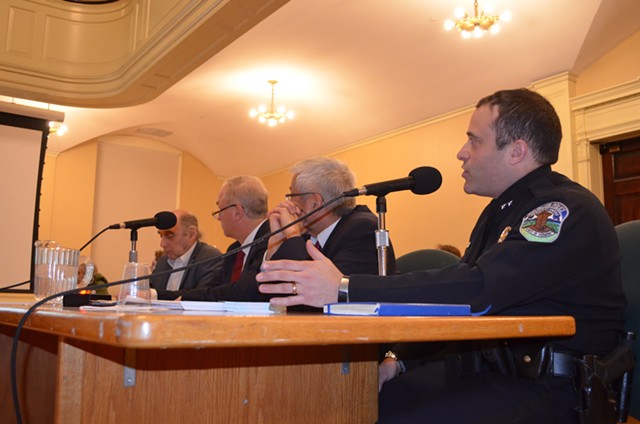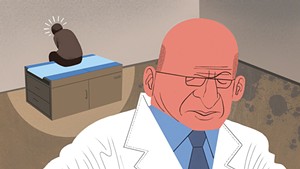
- Alicia Freese
- From left, Howard Center CEO Bob Bick, UVM Medical Center CEO John Brumstead, Health Commissioner Harry Chen and Burlington Police Chief Brandon del Pozo
Burlington police Chief Brandon del Pozo gave city councilors a crash course Monday evening on the opiate trade in Burlington.
On del Pozo's first day on the job last September, Mayor Miro Weinberger gave the new chief 90 days to assess the problem and come up with recommendations. Later that month, the council passed a resolution urging the police department to consider new strategies for combatting drug trafficking.
Del Pozo didn't quite hit his deadline, but on Monday he delivered a data-laced presentation that included several proposals to address the problem. Some were predictable — adding more officers, for instance. But others were more out-of-the-box, such as prioritizing heroin-addicted prostitutes for treatment.
Echoing the calls of many public officials, the police chief advocated for an approach that distinguishes between people selling drugs for profit and those selling to feed their addictions.
Vermont Health Commissioner Harry Chen, University of Vermont Medical Center CEO John Brumsted and Howard Center CEO Bob Bick also gave presentations.
According to police data, overdose calls in Burlington increased to 69 in 2015, up from an average of 34 during the previous three years.
But noting that only "a few dozen" key actors were "fueling" the drug trade, del Pozo told the council, "It's not this overwhelming tidal wave of a problem. It's serious and it's growing and it's bringing violence, but it's manageable in the scale of the city."
It's also concentrated in one particular part of Burlington — the Old North End. According to del Pozo's data, Ward 3 produces by far the largest volume of drug-related calls to police — officers responded to 115 between January and October of last year. Ward 2, the second busiest, was responsible for 61 calls.
Del Pozo politely rejected the council's suggestion, outlined in the September resolution, of opening a satellite police station in a former laundromat on North Street. "I'd like to demur at this time," he told them, instead advocating for more foot patrols — and adding bike patrols — to disrupt blatant on-the-street drug dealing. The chief proposed hiring additional officers to bring the police force to 100. (In recent years, there have five to 10 fewer officers due to hiring issues.)
Del Pozo said he's interested in adopting the Gloucester, Mass., police chief's policy of offering amnesty to opiate addicts who approach police seeking help. He qualified that recommendation by observing that currently, the waiting list for treatment in Chittenden County would prevent him from offering any real assistance.
Chen, Bick and Brumsted all emphasized that the waiting list has decreased from 284 last October to 234 as of last week. Since October, a group has been meeting in the mayor's office to work on whittling it down.
When it comes to getting treatment, some people — pregnant women, for example — are already moved to the top of the waiting list. Del Pozo, who called sex trafficking one of the "most disturbing aspects" of the local drug trade, said he'd like to see opiate-addicted women who are lured into prostitution prioritized as well.
He also called for more interagency collaboration,
following the example of Rutland.
Progressive Councilor Max Tracy asked del Pozo what precautions he'll take to avoid racial profiling. Del Pozo responded that "there's remarkable, remarkable diversity in the drug trade in Burlington" and stressed that racial profiling would be ineffective. But he also seemed to acknowledge the risk: "We do live with the fact that drugs are pipelined from, for example, New York City… A lot of the criminal gangs that deal with drugs out of New York are composed of, for example, African Americans, but to say they’re fueling the drug trade is just not true. It’s fueled by everyone up here."












Comments
Showing 1-1 of 1
Comments are closed.
From 2014-2020, Seven Days allowed readers to comment on all stories posted on our website. While we've appreciated the suggestions and insights, right now Seven Days is prioritizing our core mission — producing high-quality, responsible local journalism — over moderating online debates between readers.
To criticize, correct or praise our reporting, please send us a letter to the editor or send us a tip. We’ll check it out and report the results.
Online comments may return when we have better tech tools for managing them. Thanks for reading.